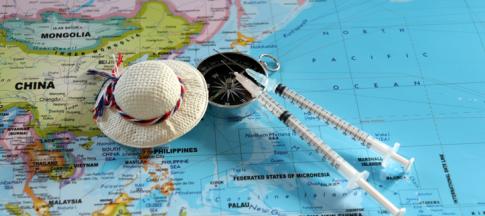
Getting ill or injured is scary at the best of times – but when you’re in a foreign country, it can be even worse. You’re unsure of where to get treatment and how much it might cost.
Here are some steps to what your travel insurance covers you for.
I’ve fallen ill abroad – what do I do now?
It depends on the severity of your illness.
For more minor injuries and illnesses, you may be able to get treatment on a pay and claim basis.
If you’re insured with us and the cost for your medical treatment is less than £500, you can pay those costs upfront and then claim it back when you get home from holiday (subject to policy terms).
For less serious medical issues, this is often easier than calling the medical emergency helpline while you’re on holiday, as this can take a few days to organise.
If you get seriously ill or injured on holiday, you need to:
- Call the 24-hour emergency assistance helpline as soon as possible – the contact details can be found under the Medical Emergency section in your policy booklet.
- Find medical treatment, either by calling the emergency services or finding a suitable medical facility near you. Getting treatment in a public medical facility may mean you don’t need to pay an excess on your claim.
If you’re travelling with medication, try to bring the packaging with you if you can as it’s important the doctors understand if you have any pre-existing conditions.
Using your EHIC or GHIC card
The European Health Insurance Card (EHIC) or the new Global Health Insurance Card (GHIC) can help you get medical treatment at an approved facility when you’re abroad in certain European countries.
The card tells foreign medical professionals about your identity and medical history.
It also reduces the cost of medical expenses or makes them free of charge, depending on the country and facility.
Read our guide to using the EHIC or GHIC abroad.
What happens if you don’t have a GHIC card
If you’ve simply forgotten your GHIC, you can apply for a Provisional Replacement Certificate (PRC) while you’re on holiday. You can apply for a PRC here.
Your insurance should still cover you for emergency medical treatments.
If you don’t have a GHIC and don’t have travel insurance either, unfortunately you will need to pay for all your medical expenses yourself.
Where to go for treatment
There could be a reciprocal health agreement between the UK and the country you’re visiting.
This just means you can access healthcare for free or at a reduced cost.
These agreements can vary around the world, so it’s important you try to research this before you head off on holiday.
Often you won’t be able to access this healthcare if you haven’t registered beforehand.
Read GOV.UK’s guide to reciprocal health agreements with different countries.
Europe
If you’re in Europe and have an EHIC or GHIC card, it’s important you try to find a facility that will accept the GHIC card.
Australia and New Zealand
If you’re travelling to Australia or New Zealand, it’s important you register for Medicare.
If you haven’t, you’ll need to contact our emergency assistance service as soon as possible, as you’ll need to get their authorisation for any treatment that’s not available under Medicare.
The USA
Medical treatment in the USA can be very expensive and there’s no reciprocal health agreements for UK residents.
If you have a medical emergency, dial 911 and ask for an ambulance.
If your issue is not life-threatening, urgent care centres give immediate medical service.
They operate on a walk-in basis, offering convenient access without the need for an appointment.
It’s important to note that you’re required to call the 24-hour emergency assistance helpline as soon as possible if you have a medical emergency or need medical assistance and your medical expenses are likely to exceed £500.
Who to contact in an emergency
Call our 24-hour emergency assistance helpline on +44 (0) 292 010 7777.
What does your travel insurance cover?
Your travel insurance should protect you if you get ill or injured on holiday. We’ll cover reasonable and necessary costs for emergency medical treatment when you’re abroad.
Your policy does not cover you for pre-planned or elective medical treatment while abroad.
It’s important you declare all your medical conditions when you buy your policy. If you don’t, it could affect your claim if you need to make one.
We’ll also cover costs for getting you back to the UK if your doctor recommends it, or if you can’t use your return ticket after your treatment has finished.
Log in to your travel portal to see your policy documents and start a claim if you need to.


